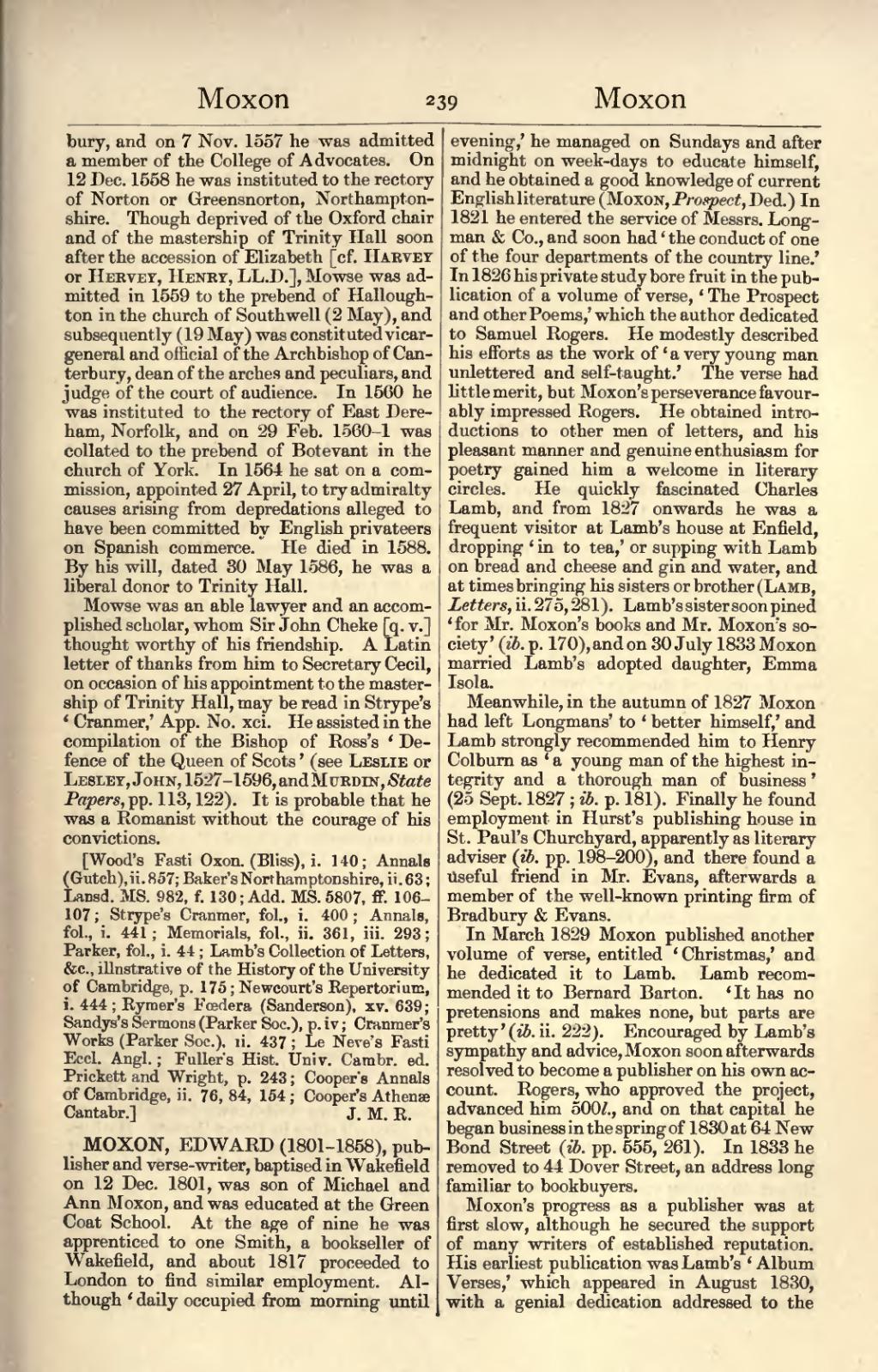bury, and on 7 Nov. 1557 he was admitted a member of the College of Advocates. On 12 Dec. 1558 he was instituted to the rectory of Norton or Greensnorton, Northamptonshire. Though deprived of the Oxford chair and of the mastership of Trinity Hall soon after the accession of Elizabeth [cf. Harvey or Hervey, Henry, LL.D.], Mowse was admitted in 1559 to the prebend of Halloughton in the church of Southwell (2 May), and subsequently (19 May) was constituted vicar-general and official of the Archbishop of Canterbury, dean of the arches and peculiars, and judge of the court of audience. In 1560 he was instituted to the rectory of East Dereham, Norfolk, and on 29 Feb. 1560-1 was collated to the prebend of Botevant in the church of York. In 1564 he sat on a commission, appointed 27 April, to try admiralty causes arising from depredations alleged to have been committed by English privateers on Spanish commerce. He died in 1588. By his will, dated 30 May 1586, he was a liberal donor to Trinity Hall.
Mowse was an able lawyer and an accomplished scholar, whom Sir John Cheke [q. v.] thought worthy of his friendship. A Latin letter of thanks from him to Secretary Cecil, on occasion of his appointment to the mastership of Trinity Hall, may be read in Strype's 'Cranmer,' App. No. xci. He assisted in the compilation of the Bishop of Ross's 'Defence of the Queen of Scots' (see Leslie or Lesley, John, 1527-1596, and Murdin, State Papers, pp. 113, 122). It is probable that he was a Romanist without the courage of his convictions.
[Wood's Fasti Oxon. (Bliss), i. 140; Annals (Gutch), ii. 857; Baker's Northamptonshire, ii. 63; Lansd. MS. 982, f. 130; Add. MS. 5807, ff. 106-107; Strype's Cranmer, fol., i. 400; Annals, fol., i. 441; Memorials, fol., ii. 361, iii. 293; Parker, fol., i. 44; Lamb's Collection of Letters, &c., illustrative of the History of the University of Cambridge, p. 175; Newcourt's Repertorium, i. 444; Rymer's Fœdera (Sanderson), xv. 639; Sandys's Sermons (Parker Soc.), p. iv; Cranmer's Works (Parker Soc.), ii. 437; Le Neve's Fasti Eccl. Angl.; Fuller's Hist. Univ. Cambr. ed. Prickett and Wright, p. 243; Cooper's Annals of Cambridge, ii. 76, 84, 154; Cooper's Athenæ Cantabr.]
MOXON, EDWARD (1801–1858), publisher and verse-writer, baptised in Wakefield on 12 Dec. 1801, was son of Michael and Ann Moxon, and was educated at the Green Coat School. At the age of nine he was apprenticed to one Smith, a bookseller of Wakefield, and about 1817 proceeded to London to find similar employment. Although 'daily occupied from morning until evening,' he managed on Sundays and after midnight on week-days to educate himself, and he obtained a good knowledge of current English literature (Moxon, Prospect, Ded.) In 1821 he entered the service of Messrs. Longman & Co., and soon had 'the conduct of one of the four departments of the country line.' In 1826 his private study bore fruit in the publication of a volume of verse, 'The Prospect and other Poems,' which the author dedicated to Samuel Rogers. He modestly described his efforts as the work of 'a very young man unlettered and self-taught.' The verse had little merit, but Moxon's perseverance favourably impressed Rogers. He obtained introductions to other men of letters, and his pleasant manner and genuine enthusiasm for poetry gained him a welcome in literary circles. He quickly fascinated Charles Lamb, and from 1827 onwards he was a frequent visitor at Lamb's house at Enfield, dropping 'in to tea,' or supping with Lamb on bread and cheese and gin and water, and at times bringing his sisters or brother (Lamb, Letters, ii. 275, 281). Lamb's sister soon pined 'for Mr. Moxon's books and Mr. Moxon's society' (ib. p. 170), and on 30 July 1833 Moxon married Lamb's adopted daughter, Emma Isola.
Meanwhile, in the autumn of 1827 Moxon had left Longmans' to 'better himself,' and Lamb strongly recommended him to Henry Colburn as 'a young man of the highest integrity and a thorough man of business' (25 Sept. 1827; ib. p. 181). Finally he found employment in Hurst's publishing house in St. Paul's Churchyard, apparently as literary adviser (ib. pp. 198-200), and there found a useful friend in Mr. Evans, afterwards a member of the well-known printing firm of Bradbury & Evans.
In March 1829 Moxon published another volume of verse, entitled 'Christmas,' and he dedicated it to Lamb. Lamb recommended it to Bernard Barton. 'It has no pretensions and makes none, but parts are pretty' (ib. ii. 222). Encouraged by Lamb's sympathy and advice, Moxon soon afterwards resolved to become a publisher on his own account. Rogers, who approved the project, advanced him 500l., and on that capital he began business in the spring of 1830 at 64 New Bond Street (ib. pp. 555, 261). In 1833 he removed to 44 Dover Street, an address long familiar to bookbuyers.
Moxon's progress as a publisher was at first slow, although he secured the support of many writers of established reputation. His earliest publication was Lamb's 'Album Verses,' which appeared in August 1830, with a genial dedication addressed to the
